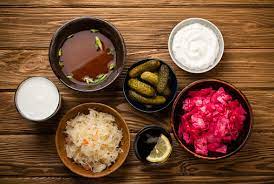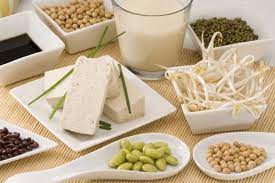Foods We Should Never Combine With Milk
Note: Friends, if you want to read this article in any other language, please change the language from the translate button at the top of this article.
 |
| There are certain foods that may not pair well with milk |
There are certain foods that may not pair well with milk and may cause digestive discomfort or affect the absorption of certain nutrients.
Here are some examples:
Citrus fruits:
Citrus foods such as oranges, lemons, limes, and grapefruits contain citric acid. When combined with milk, the acid can cause the proteins in milk to coagulate or curdle.
This reaction can make it difficult to digest the milk and can lead to digestive discomfort, such as bloating, cramps, or diarrhea.
Overall, it is best to avoid combining citrus fruits with milk, and instead consume them separately or with other foods that do not contain milk.
If you do choose to consume citrus fruits with milk, it is best to do so in small quantities and monitor how your body responds.
Spicy foods:
Spicy foods can cause heartburn, indigestion, and stomach discomfort, particularly in people who are sensitive to spicy foods.
When spicy foods are combined with milk, it can exacerbate these symptoms.
The capsaicin in spicy foods can stimulate the production of acid in the stomach, which can further irritate the digestive system.
In addition, milk contains fat, which can also worsen the symptoms of heartburn and indigestion. The fat in milk can increase the production of stomach acid, which can lead to acid reflux and discomfort.
Moreover, the combination of spicy foods and milk can also affect the taste and texture of the milk, making it less palatable for some people.
Fish:
The combination of fish and milk is not recommended because it can be difficult to digest and can affect the absorption of certain nutrients.
Both fish and milk are rich sources of protein, and consuming them together can cause the protein in the milk to bind with the amino acids in the fish, making it difficult for the body to digest and absorb these nutrients.
This reaction can lead to digestive discomforts such as bloating, gas, or diarrhea, particularly in people who are lactose intolerant or have difficulty digesting certain types of fish.
Moreover, fish contains high amounts of minerals such as zinc and calcium, while milk is rich in calcium and phosphorus.
However, consuming fish with milk can affect the absorption of these minerals and make them less available for absorption by the body.
Fermented foods:
 |
| When fermented foods are combined with milk, it can interfere with the absorption of nutrients |
Fermented foods such as yogurt, kefir, and kimchi contain live cultures of beneficial bacteria that are important for gut health.
However, when fermented foods are combined with milk, it can interfere with the absorption of nutrients and cause digestive discomfort.
Milk contains lactose, a type of sugar that is broken down by an enzyme called lactase.
Some people do not produce enough lactase, which can lead to lactose intolerance and digestive symptoms such as bloating, gas, and diarrhea.
When fermented foods are combined with milk, the live cultures can break down lactose and produce more gas, which can worsen these symptoms.
Moreover, fermented foods are acidic, and when combined with milk, the acid can cause the proteins in the milk to coagulate or curdle.
This reaction can make it difficult to digest the milk and can lead to digestive discomfort.
Cereal grains:
Cereal grains such as wheat, oats, and rice are commonly consumed with milk, but the combination can interfere with the absorption of certain nutrients.
Cereal grains contain phytic acid, a compound that can bind with minerals such as calcium, iron, and zinc, making them less available for absorption by the body.
Milk is a rich source of calcium and vitamin D, which are important for bone health.
However, the calcium in milk can bind with phytic acid, reducing its bioavailability and making it less effective for maintaining strong bones and teeth.
Moreover, the combination of cereal grains and milk can be high in carbohydrates and can cause a spike in blood sugar levels, particularly in people who are sensitive to carbohydrates or have insulin resistance.
This can lead to feelings of fatigue, hunger, and irritability.
Overall, it is best to consume cereal grains separately from milk or combine them with other foods that can enhance the absorption of nutrients.
For example, soaking or sprouting grains before cooking can reduce the amount of phytic acid and improve their nutrient availability.
You can also pair cereal grains with sources of vitamin C, such as berries or citrus fruits, to enhance the absorption of iron.
Tea:
Tea is a popular beverage that is enjoyed for its flavor and health benefits. However, combining tea with milk can interfere with the absorption of certain nutrients and affect the taste and texture of the tea.
Tea contains compounds called catechins, which are antioxidants that have been linked to a variety of health benefits, including reducing the risk of chronic diseases.
However, when tea is combined with milk, the proteins in the milk can bind with the catechins, making them less available for absorption by the body.
Moreover, the combination of tea and milk can affect the taste and texture of the tea.
Milk can reduce the bitterness of tea and add creaminess, but it can also dilute the flavor and aroma of the tea.
Some people find that the combination of tea and milk can cause stomach discomfort or indigestion, particularly if they are sensitive to caffeine or lactose.
Overall, it is a matter of personal preference whether or not to combine tea with milk.
If you enjoy the combination, you can choose to consume it in moderation and pay attention to how your body responds.
It is also recommended to choose high-quality tea and milk to optimize their nutritional content.
Alternatively, you can also enjoy tea without milk or pair it with other ingredients such as lemon, honey, or herbs to enhance the flavor and health benefits.
Pungent or bitter foods:
Combining pungent or bitter foods with milk is generally not recommended because it can interfere with the taste and digestion of both foods.
Pungent or bitter foods such as garlic, onions, ginger, and spices are often used for their flavor and health benefits.
However, when combined with milk, the strong flavors of these foods can overpower the taste of the milk and make it less enjoyable.
Moreover, pungent or bitter foods can also affect the digestion of milk. They can stimulate the production of digestive juices in the stomach and increase acidity, which can make it difficult for the stomach to digest the protein and fat in milk.
This can lead to symptoms such as bloating, gas, or indigestion.
Additionally, some bitter foods contain compounds that can interfere with the absorption of calcium in milk, reducing its bioavailability and making it less effective for maintaining strong bones and teeth.
Meat:
Combining meat with milk is not recommended in certain dietary traditions, such as kosher and halal diets. In these traditions, it is forbidden to consume meat and dairy products together due to cultural, religious, or ethical reasons.
However, from a nutritional standpoint, there is no scientific evidence to suggest that combining meat and milk is harmful.
That being said, some people may experience digestive discomfort when consuming meat and milk together. This may be due to the fact that meat is a source of protein and milk contains lactose, a type of sugar that can be difficult to digest for some people.
Consuming large amounts of protein and lactose at the same time can overload the digestive system and lead to symptoms such as bloating, gas, or diarrhea.
Additionally, some studies suggest that consuming high amounts of animal protein, including meat and dairy, may increase the risk of certain health conditions such as heart disease, cancer, and osteoporosis.
However, these studies are not specific to the combination of meat and milk and more research is needed to determine the potential health effects of this combination.
Soy products:
Combining soy products with milk is generally not recommended because it can interfere with the absorption of nutrients and affect the taste and texture of both foods.
Soy products such as tofu, tempeh, and soy milk are popular sources of plant-based protein and are often used as a dairy alternative.
However, when combined with milk, the proteins in soy can interact with the proteins in milk, leading to coagulation or curdling. This can affect the taste and texture of both foods, making them less enjoyable.
Moreover, soy contains compounds called phytates, which can interfere with the absorption of minerals such as calcium, iron, and zinc.
When consumed with milk, which is also a source of calcium, the phytates in soy can bind with the calcium in milk, reducing its bioavailability and making it less effective for maintaining strong bones and teeth.
Furthermore, some people may be allergic or intolerant to soy or lactose, and consuming these foods together can trigger an adverse reaction or exacerbate their symptoms.
Again, it's important to note that everyone's body reacts differently to different foods and beverages, so what works well for one person may not work well for another.
Friends, Stay Fit, Stay Happy
--------------------------------------------------------
Friends, if you liked it, please share it with your friends.
SHARING IS CARING.
Compiled by: Paramjit Singh Rana




Comments
Post a Comment